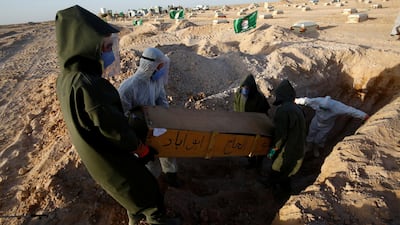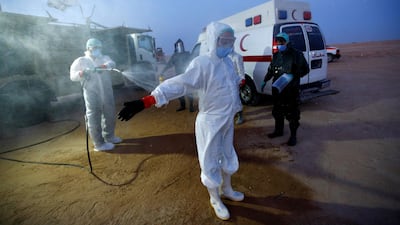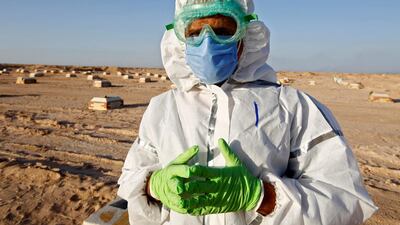Iraqi paramedic Sarmad Ibrahim cut his teeth treating fellow militiamen in the war against ISIS.
Now he buries Covid-19 victims, an exhausting task where he must also come to grips with Muslim and Christian burial rites.
“So far we’re coping,” Mr Ibrahim said as fellow volunteers from the Imam Ali Combat Brigade prepared to handle a coffin from Baghdad.
“But if we start receiving more bodies we might not be able to bury according to religious rules.”
He and the other team members work at a new cemetery in the southern city of Najaf, Iraq’s only graveyard specifically for those who have died of Covid-19.
Established after an edict from Iraq’s top Shiite cleric Grand Ayatollah Ali Al Sistani, it is dwarfed by the nearby Wadi Al Salam cemetery, the largest in the world, but is expanding.
More than 200 people have died since the outbreak began in Iraq in February and the volunteers say they receive between two and four corpses each day.
Coronavirus in the Middle East
The country’s confirmed coronavirus infections have jumped from about 3,000 to more than 6,000 in just over two weeks, Health Ministry figures show.
Mr Ibrahim and his comrades joined the brigade as part of Iraq’s Popular Mobilisation Forces paramilitary umbrella group to fight ISIS several years ago.
While this enemy is very different, the work is physically and emotionally draining.
Bodies often arrive at night. The volunteers, in full protective suits, wash and wrap the corpses in black burial shrouds before putting them back in the coffins.
They carry the coffins to the graves under the headlights of their vehicles.
The team has struggled to expand beyond its dozen or so members.
Some medics say suspected exposure to the virus has alienated them from their families and neighbours, and for these volunteers it is no different, even though there is no evidence that Covid-19 can be caught from corpses.
“If we face a shortage of men, I’ll have to ask friends or other fighters to come and help us," said "Abu Sajad", 46, another militiaman.
"I’m afraid that if someone catches the virus, relatives will blame me for it."
Abu Sajad had not told his family that he was working in the cemetery and said the friends who knew were reluctant to meet him.
Some tribes and local religious leaders have refused to bury victims of the virus in local cemeteries, which is why the new graveyard was set up.
“In the beginning, bodies were brought back to the morgue where they stayed for up to 15 days,” said Abdul Hassan Kadhim, who leads the burial volunteer team.
“They ended up being buried without proper religious rites.”
At this cemetery the team must respect those rites.
Relatives are allowed to watch from a distance and a student from a local seminary leads prayers around each Muslim grave. Two Christians were recently buried there as well.
“We know they’d prefer to be buried in their own graveyards but because of the pandemic, they now rest here,” Abu Sajad said, kneeling in front of one of the Christian graves.
“We asked for advice on Christian burials, to be able to carry them out according to their own rituals and traditions.
"I didn’t know about them before but we did everything the way our Christian brothers told us.”





























